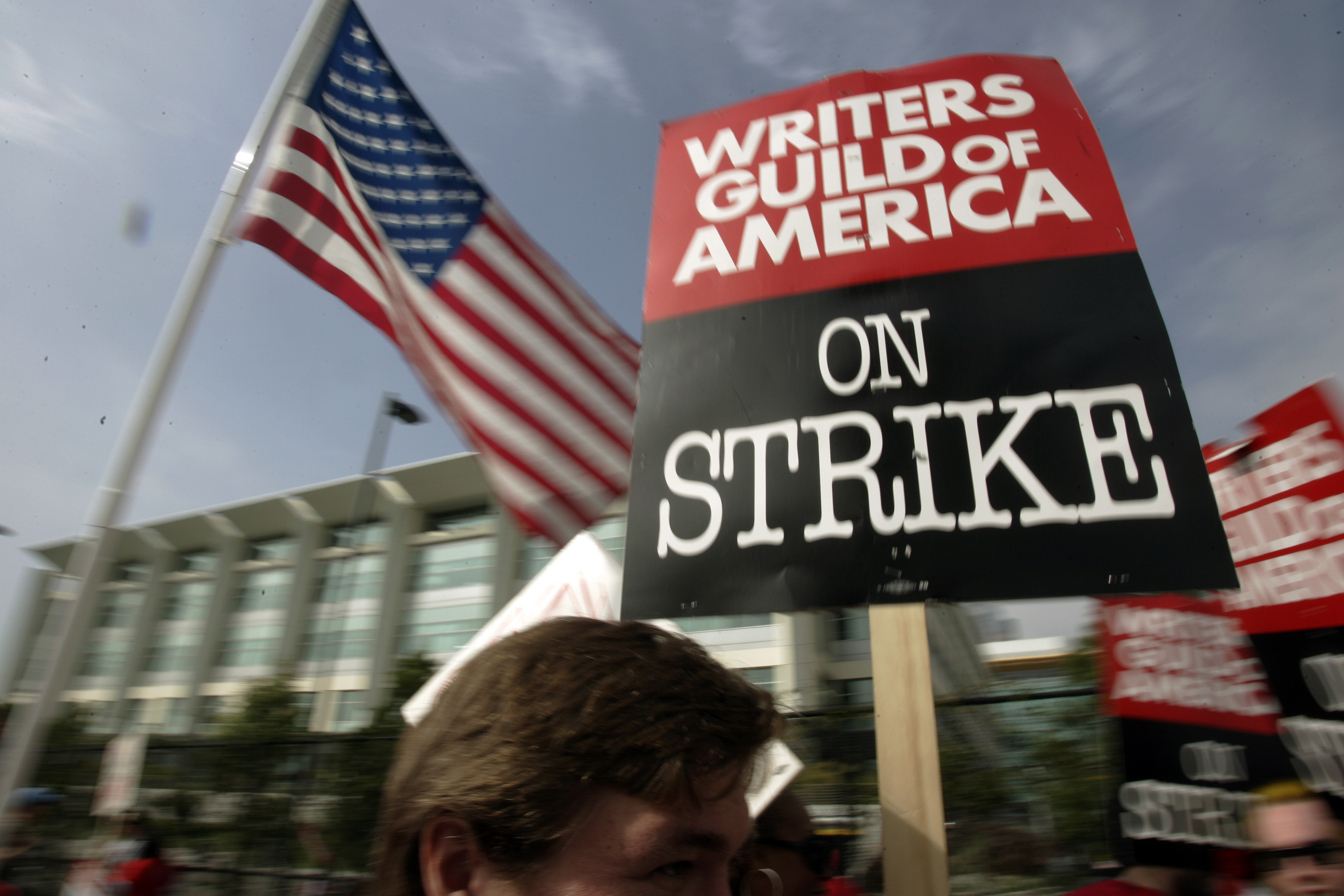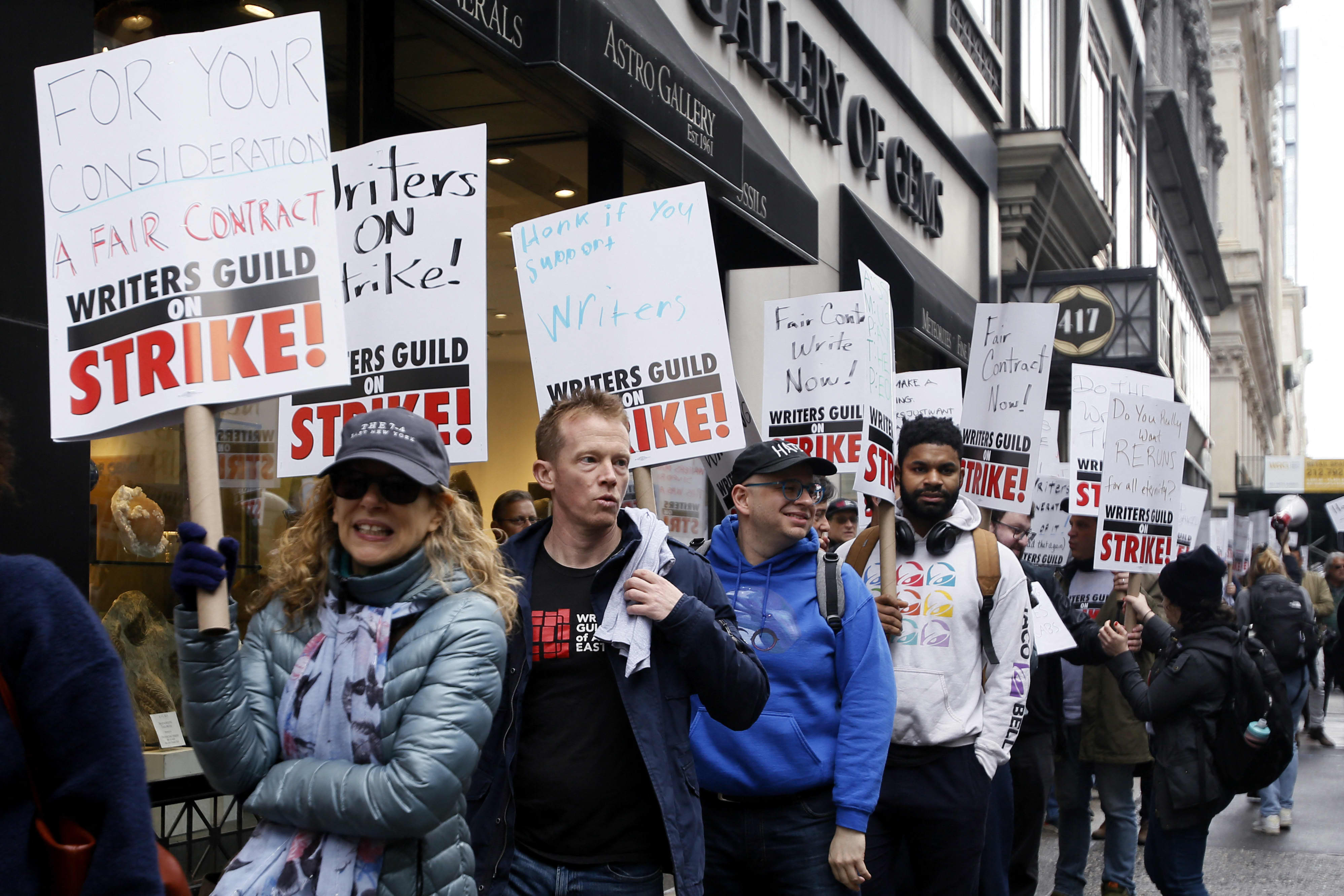Thousands of writers in the entertainment industry went on strike Tuesday after months of negotiations, primarily over pay for streaming shows, failed to result in a labor agreement.
Picketing was planned for Tuesday afternoon outside several Los Angeles-area studios after the leaders of the Writers Guild of America's West Coast and East Coast branches announced that contract talks broke down. The union officially went on strike when the current contract expired at 12:01 a.m. Tuesday.
The strike will disrupt work on hundreds of movies, scripted TV series, talk shows and streaming productions. The severity of the disruption largely depends on how long the strike lasts.
The first shows that will go dark will be late night talk shows. Scripted series and films will take longer to be affected.
Here's what viewers can expect.
Get Tri-state area news delivered to your inbox. Sign up for NBC New York's News Headlines newsletter.
Late-Night Talk Shows
The late-night talk shows, like 'The Tonight Show Starring Jimmy Fallon' and 'Late Night With Seth Meyers,' are likely to feel the most immediate impact. They depend on same-day content based on current events. NBC's 'The Tonight Show Starring Jimmy Fallon' and ABC's 'Jimmy Kimmel Live!' are scheduled to air new episodes this week. They haven't yet announced their plans, but will likely shift to reruns.
During the 2007 strike, late-night hosts eventually returned to the air and improvised material.
On Friday’s episode of “Late Night,” Seth Meyers, a WGA member who said he supported the union’s demands, prepared viewers for re-runs while lamenting the hardship a strike entails.
"It doesn’t just affect the writers, it affects all the incredible non-writing staff on these shows," Meyers said. "And it would really be a miserable thing for people to have to go through, especially considering we’re on the heels of that awful pandemic that affected, not just show business, but all of us."
Weekly shows like 'Saturday Night Live' have a longer production timeline, but are even more dependent on comedy writers for content. A strike would upend the last three episodes of this 'SNL' season, starting with this Saturday's show with host Pete Davidson.
The status of daytime talk shows, which lean more into host chats and interviews, would be less certain. ABC's 'The View' was uninterrupted during the last strike, which began late in 2007 and ended early in 2008.
Scripted Series and Movies
Scripted series and films will take longer to be affected. Even daily soap operas tend to have scripts completed many months in advance.
But if a strike persisted through the summer, fall schedules could be upended. And in the meantime, not having writers available for rewrites can have a dramatic effect on quality. The James Bond film "Quantum of Solace" was one of many films rushed into production during the 2007-2008 strike with what Daniel Craig called "the bare bones of a script."
"Then there was a writers' strike and there was nothing we could do,” Craig later recounted. “We couldn’t employ a writer to finish it. I say to myself, ‘Never again’, but who knows? There was me trying to rewrite scenes — and a writer I am not.”
With a walkout long expected, writers have rushed to get scripts in and studios have sought to prepare their pipelines to keep churning out content for at least the short term.
“We’re assuming the worst from a business perspective,” David Zaslav, chief executive of Warner Bros. Discovery, said last month. “We’ve got ourselves ready. We’ve had a lot of content that’s been produced.”
Noticeable effects on the movie release calendar could take even longer.
Production on finished screenplays can proceed as planned (without the benefit of last-minute rewrites). That's assuming that crews — whose union recently came very close to striking — and actors — whose guild's own contract with the AMPTP expires June 30 — are willing to cross picket lines and work.
Productions, long aware of the looming deadline, sought to wrap before it arrived. FilmLA, which hands out location permits for the Los Angeles area, said that none have been requested for television dramas or sitcoms this week.
Many viewers and moviegoers may not notice the effects of a strike until long after it's over, if at all. The menus on Netflix and Amazon Prime Video will look no different next week, but because this would be the first writers' strike of the streaming era, there is no template for how they will look months down the line.
During the last strike, when broadcast and cable networks with well-established seasonal schedules were still predominant, many shows, including '30 Rock,' 'CSI,' and 'Grey's Anatomy,' shortened their seasons.
Unscripted reality television grew in strength at the time. “Big Brother” and “The Amazing Race” both increased their output. “The Apprentice,” hosted by Donald Trump, got new life when a celebrity version of the shelved show was created to help fill the scripted void.
Overseas series could also fill some of the void. “If there is one, we have a large base of upcoming shows and films from around the world,” said Ted Sarandos, Netflix co-chief executive, on the company’s earnings call in April.
Yet the WGA strike may only be the beginning. Contracts for both the Directors Guild of America and SAG-AFTRA, the actors union, expire in June. Some of the same issues around the business model of streaming will factor into those bargaining sessions. The DGA is set to begin negotiations with AMPTP on May 10.
Why Writers Are Striking
Streaming and its ripple effects are at the center of the dispute. The guild says that even as series budgets have increased, writers’ share of that money has consistently shrunk.
Streaming services' use of smaller staffs — known in the industry as “mini rooms” — for shorter stints has made sustained income harder to come by, the guild says. And the number of writers working at guild minimums has gone from about a third to about half in the past decade. Writers of comedy-variety shows for streaming have no minimum protections at all, the guild says.
The lack of a regular seasonal calendar in streaming has depressed pay further, the report says. And scheduled annual pay bumps under the current contract have fallen well short of increases in inflation.
The Alliance of Motion Picture and Television Producers, which represents Hollywood’s studios, streamers and production companies, say their priority is “the long-term health and stability of the industry” and they are dedicated to reaching “a fair and reasonable agreement.”



